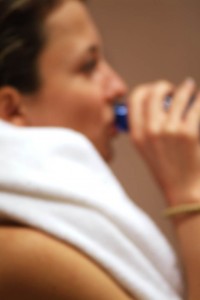 All the advertisements on television would make us believe that if you are participating in any sports you need to have sports drinks to help you. The ads target children and youth marketing them as a healthy alternative to soda. Are they necessary? Do they help you? Is the cost worth it?
All the advertisements on television would make us believe that if you are participating in any sports you need to have sports drinks to help you. The ads target children and youth marketing them as a healthy alternative to soda. Are they necessary? Do they help you? Is the cost worth it?
The ads state that if you are feeling tired or slow, just drink an energy drink and you will feel better and have more energy. The array of sports and energy drinks from sports beverages, vitamin waters, and concentrated tiny bottles vary in cost. It’s hard to determine what, which one or if you should buy one. Ask a teen and they will probably tell you which one you should buy, as the ads have convinced them they are necessary.
But are they really necessary? We all need to stay hydrated, especially if we are playing a sport or working out. Water is best for all of us. However, unless you are participating in prolonged vigorous physical activity lasting longer than an hour in hot, humid conditions you don’t need the sports drinks. During prolonged vigorous physical activity when your body sweats you lose electrolytes like sodium and potassium which keep the body’s fluid levels in balance and help the muscles work properly. Sports drinks contain electrolytes to help restore what is lost and also have carbohydrates (sugar) which provide energy.
One recent study found that consuming a banana and water provided the same performance benefit as drinking a sports drink. This could be a healthier alternative as it contains no added sugar and many other nutrients as compared to the sports drink.
Sports drinks contain added sugar and have 50 to 90 percent of the calories found in soda. They are nutrient poor and have been found to increase the erosion of tooth enamel. Save your money and skip the sports drinks unless you or your child is participating in prolonged physical activity lasting more than an hour in hot, humid conditions.
The stores are full of a variety of vitamin waters containing different supplements and combinations. Drink plain water or water with a splash of fruit in it and save some money. Many studies are questioning whether our body really benefits from vitamin pills and all the supplements. It is better to get your nutrients from eating a balanced diet.
Energy drinks are everywhere with most of them heavy on sugar and caffeine. Caffeine can affect us in many ways from jitteriness, upset stomachs, difficulty sleeping, headaches, and difficulty concentrating. Some of the energy drinks contain additional ingredients which can cause other problems. Children and teens should avoid energy drinks as they can cause serious side effects in youth. For the rest of us we are better off eating a healthy diet and getting a good night’s sleep.
Skip the sports drinks, vitamin waters, and energy drinks. We will have more money in our pocket and also avoid some possible health risks.
References:
Dayton’s Children’s Hospital Sports and Energy Drinks: Should Your Child Drink Them? Available online at http://www.childrensdayton.org/cam/kidshealth/4bb2de9eb7a2d4dc/index.html
Nieman, D., Gillitt, N., Henson, D., Sha, W., Shanely, A., Knab, A., Cialdella-Kam, L., Jin, F. Bananas as an Energy Source during Exercise: A Metabolomics Approach Available online at http://www.plosone.org/article/info%3Adoi%2F10.1371%2Fjournal.pone.0037479
Story, M. and Klein, L. Consumption of Sports Drinks by Children and Adolescents Issue Brief Healthy Eating Research for Robert Wood Johnson Foundation, June 2012
Author: Pat Brinkman, Ohio State University Extension Educator Family and Consumer Sciences
Reviewed by: Linnette Goard, Field Specialist, Food Safety, Selection and Management, Ohio State University Extension, Family and Consumer Sciences.

